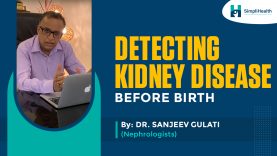Dr. Sanjeev Gulati
Dr. Sanjeev Gulati
Can kidney diseases be diagnosed before birth?
Dr. Sanjeev Gulati, Director of Kidney Clinic, Chandigarh has experience working in Australia, the UK, Canada and India for 30 years altogether.
The kidney diseases which can be diagnosed before birth are:
- Congenital Anomalies of the Kidney and Urinary Tract (CAKUT)
- Hereditary kidney diseases.
How are the diagnoses made?
The easiest and cheapest test done is the ultrasound test to diagnose kidney disease in the baby before birth. The two crucial things that significantly affect the diagnosis and later treating the disease are: number one, the person doing the ultrasound should be an expert and have experience in detecting any disorders, and the other thing is the machine used for the ultrasound should be advanced.
The primary indicator of an ultrasound is the embryotic fluid volume. The water sack around the baby is nothing but the fetus’s urine, which, if adequate, is a useful marker that the kidney is functioning properly.
Another thing to keep in mind is the size of the kidney. The kidney’s size is supposed to increase with respect to the fetus’s size. According to Dr. Gulati, by getting periodic Ultrasound done, one can monitor the size of the kidney and check for swelling in the kidney called Hydronephrosis.
The other way of detecting any kidney abnormality in the fetus is by a genetic test called Amniocentesis. There are minimal diseases that can be detected by a genetic test and are readily available. Kidney diseases like Polycystic Kidney Disease, Nephrotic Syndrome and FSGS can be seen with Next-Generation Sequencing.
Getting a genetic test is only beneficial if someone in the immediate family has any of these diseases; the unborn child is suspected of having it. In comparison, ultrasound testing is a modality that every pregnant lady should do. The ultrasound should also be done by a radiologist who has the expertise for it. One can also consult a dedicated fetal medicine specialist and get tested if necessary. By getting the tests recommended by Dr. Sanjeev Gulati from a good radiologist, 95% of kidney diseases could be detected in the fetus before birth.
As Amniocentesis comes with a little risk, it is usually performed by a fetal medicine specialist and is only performed on a selected restricted subgroup of patients. According to Dr. Sanjeev, ultrasound remains the predominant one.
When should one get the tests done?
It takes 18-20 weeks for a kidney to develop in a fetus, so the ultrasound tests done before the 18 weeks of pregnancy are not credible. If the ultrasound tests are done between 18-24 weeks of pregnancy and examined carefully, many kidney diseases or abnormalities can be detected in the fetus.
What is the next step?
To this question, Dr. Sanjeev says that once the patient finds out that their unborn child has a kidney defect, they tend to panic and stress whether to continue the pregnancy or terminate it. But according to him, most of these diseases are easily manageable, and one should not panic. In his 30 years of experience, there was only one case that leads to termination, where a female fetus was diagnosed with Micro Bladder Syndrome, also known as Megacystis-microcolon syndrome, which is very dangerous kidney disease.
The other common findings like Hydronephrosis there is no need to terminate the pregnancy as these disorders can be treated resulting in a fully functioning kidney.
The baby’s delivery date depending on the abnormalities is fixed by studying and planning all the aspects of the pregnancy. The hospital where the delivery is supposed to be done is also selected, whether it should be a normal hospital or a specialized one where a top nephrologist is available
Comments (1)
LEAVE YOUR COMMENT Cancel reply







How to maintain your Neuro system with pranayam?